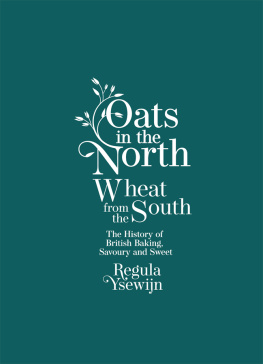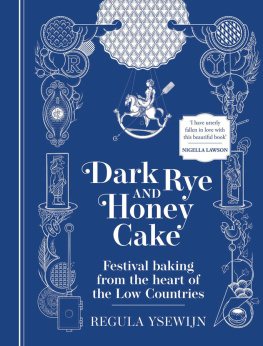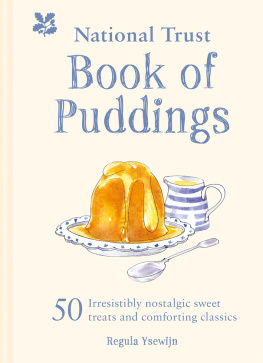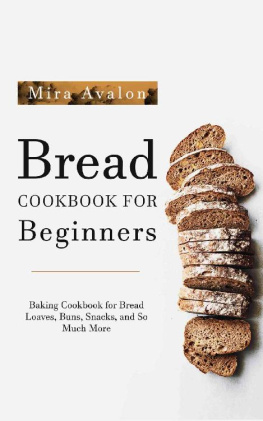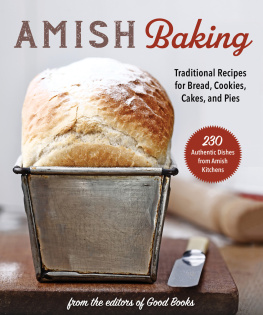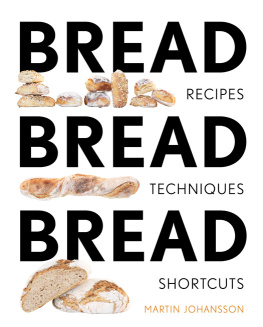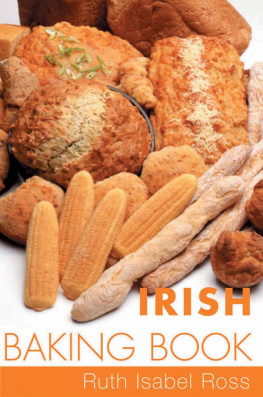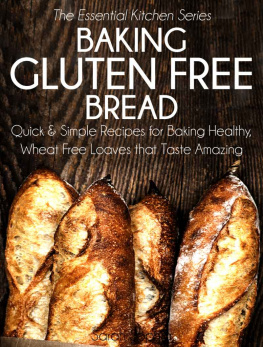A feast for the eyes, as well as the stomach, meticulously researched and beautifully photographed, this is a true love letter to the food Britain does best. One to savour, and treasure, but most of all, one to bake from! Felicity Cloake, The Guardian
Oats in the North, Wheat from the South takes the reader on a guided tour of Great Britains baking heritage, exploring the British affection for tea and toast, as well as one Yorkshire towns 200-year-old obsession with baking the worlds largest meat pie. Each of the timeless recipes in this book is accompanied by stories of the landscape, legends and traditions of Great Britain, from Saffron cake, Cornish pasties, Welsh Bara brith, Shrewsbury cakes and Isle of Wight doughnuts to tarts, oatcakes, gingerbreads, traditional loaves, buns and bread rolls such as Aberdeen butteries and Kentish huffkins.
Regula shows us how the diverse climate of the British Isles influenced the growth of cereal crops and the development of a rich regional baking identity. She explains how imports of spices, sugar, treacle, fortified wines and citrus added flavour, colour and warmth to a baking culture much adored and replicated all over the world.
An excellent and diligently
written book celebrating some
super-tasty British treats
JAMIE OLIVER
Regula Ysewijn is a Belgian author and photographer with a particular interest in historical recipes and the evolution of our food and drink culture. Her books Pride and Pudding and Belgian Caf Culture were both lauded by BBC Radio Fours acclaimed The Food Programme. Pride and Pudding was also shortlisted for the Fortnum & Mason Food and Drink Awards and the Andr Simon Awards. Regula is a judge on the Flemish version of The Great British Bake Off in Belgium. This is her fifth book.
regulaysewijn.com
For my husband, Bruno.
I want to acknowledge that most of the cakes, gingerbreads and biscuits in this book would not have existed if not for sugar imports that were made possible due to slavery, which was particularly concentrated in the Caribbean islands of Barbados, St. Kitts, Nevis, Antigua and Jamaica, and later Grenada and Trinidad in the 17th, 18th and 19th century, until the Slavery Abolition Act took effect on August 1, 1834 which unfortunately only resulted in partial liberation.
Sugar has a cost, and that cost was paid by those held in bondage.


Five sisters of Kintail ( Cinn Tile ), North-west Highlands of Scotland
Simon the Pieman, Rye, East Sussex
FOREWORD
I first met Regula when we were sitting in a London restaurant, filming a documentary on British puddings. She lit up the room with her smile, her style and her effervescent enthusiasm for British baked goods.
Growing up in the 1980s, my Britain was not like hers. It was far from that of quaint streets and polite customs. I read Austen, Wordsworth and Dickens at school under duress, and my holidays involved freezing on a rain-swept beach with a gritty picnic. I grew up in a Britain in which the supermarket sticky bun was a Saturday treat, white sliced bread was king, and our village had long since lost its bakery.
But even then, all was not lost, and I recognise that Regulas fascinating Britain co-existed with my own, gastronomically challenged version. I envy Regula her travels as a teen, roving around a country I took for granted, eating flavours I would not encounter until, as an adult and a historian, I deliberately sought them out. But while I never roved, I nevertheless ate. I remember curd tarts from my Grandmas local bakery, simultaneously sweet and savoury and bitter with nutmeg. She made her own bread, and would smack our fingers for stealing rolls, smothering them in butter, while the loaves cooled on racks in her kitchen. I discovered a tiny back-street bakery in the town where I spent my Saturdays, and together with a friend we would buy an apple tart for four and tear it apart, the crust crumbling instantly to let us plunge hungry fingers into its fluffy interior.
By the 1990s the rediscovery of a rich and brilliant British culinary heritage was in full flow, and bakes that were teetering on the edge of extinction or had already disappeared completely were being reinvented, brought back for a modern generation. I moved to France, and only then did the unique nature of British baking really strike home. As I gorged on delicate gateaux and pastry confections, which no-one would ever dream of making at home, I realised the fundamental truth that there are some things that do not translate: cake, buns, puddings and afternoon tea. (Ill be fair, cake in French is le cake , pudding is le poudding and afternoon tea is le five oclock. ) British baking isnt about the ethereal, sweet treats of the patisserie, originally destined for the dinner table, it offers you something more solid. Our bakes are sturdy, doughty, packed with fruit, spice and flavour. They dont dance around your palate; they grab you and hug you, and tell you its all going to be all right.
Food tells us so much about who we are as individuals, as communities and as a nation. The myths we weave about foods are so often invented, crumbling like shortbread when faced with the reality of life in the past. Yet the need to invent backstories, to mythologise our pasties and our simnels is as valuable and as fascinating as the foods themselves. Reading this book, Im reminded of both how intensely local Britain could (and can) be, and yet how connected every tiny community, baking its own bun, was (and is). Most of these recipes were born in the 18th century, a time of huge cultural and social change. Britain was busy abroad, exploring, trading, colonising, and it was a time of enormous scientific and artistic discovery, as well as unbelievable exploitation and cruelty. Those who baked or ate baked goods were all playing their part. Sugar came from the West Indies, spice from the East. In the 19th century, strong flour was imported from Eastern Europe and Northern America, eggs from France and butter from Ireland. Yet locality was also crucial the South favoured wheat, the North clung to its oats. Ovens were rarer in the North than the South, and fuel types and working conditions also played a role in cementing the specialities of each area. But it is the interplay of these practicalities along with the stories whether true or invented which make a whole so much greater than either on their own.
That, then, is the joy of this book. Its a love letter to British baking and all that that implies. It brings together buns and bakes that youll find in every local shop, and cakes and breads that have long since disappeared. Here youll find recipes both old and new, resurrected for the future, together with the stories that make them such a window onto both the past and the present. The joy of Regulas writing is that through it all, we realise that it takes an outsider looking in to show us who we truly are. This is a beautiful book. It is a lyrical book. It is a book full of good things, modern and old, with a multitude of real heritage and imagined tradition behind them. Enjoy.

